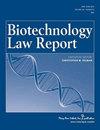在生物银行中导航跨境挑战:分析欧盟立法,欧洲法院判例法和国际私法的作用
IF 0.3
4区 生物学
Q4 BIOTECHNOLOGY & APPLIED MICROBIOLOGY
引用次数: 0
摘要
生物银行作为生物样本和相关数据的存储库,在推进生物医学研究和实现全球范围内的个性化医疗方面发挥着关键作用。然而,生物银行的跨境运营面临着来自不同司法管辖区不同监管框架的复杂法律挑战。本文对欧盟(EU)内部跨境生物银行的复杂性进行了全面分析,重点关注欧盟立法和欧洲法院(ECJ)制定的著名法律先例。此外,它还考察了利用国际私法机制来导航生物银行活动中固有的法律复杂性的有效性。第一部分详细审查了现有的欧盟生物银行立法,确定了成员国之间法律差异造成的潜在冲突和差异。特别注意数据保护、知情同意和生物样品的运输。随后,该研究深入探讨了欧洲法院关于生物银行和数据共享的重要裁决,强调了法院在跨境生物银行背景下建立的法律原则。第三部分探讨了国际私法文书在应对欧盟立法和判例法带来的挑战方面的重要性。它调查了法律选择的应用,管辖权,以及判决的承认和执行,以解决在不同法律管辖区经营的生物银行之间的冲突。此外,该研究强调了国际公约和条约在促进跨境生物银行实践协调方面的潜力。通过阐明法律理论和框架如何促进有效的跨境生物库合作,本文为政策制定者、法律专业人士和生物库管理人员提供了宝贵的见解。它提出了在生物技术和知识产权的复杂法律环境中加强国际合作的建议。利用国际私法可以追求统一的生物银行做法,从而推动科学知识和医学发现的重大进步。本文章由计算机程序翻译,如有差异,请以英文原文为准。
Navigating Cross-Border Challenges In Biobanking: Analysing Eu Legislation, ECJ Case Law, and the Role of Private International Law
Biobanks, as repositories for biological samples and associated data, play a pivotal role in advancing biomedical research and enabling personalized medicine on a global scale. However, the cross-border operation of biobanks faces intricate legal challenges arising from diverse regulatory frameworks across jurisdictions. This article offers a comprehensive analysis of the complexities surrounding cross-border biobanking within the European Union (EU), focusing on EU legislation and the notable legal precedents set by the European Court of Justice (ECJ). Additionally, it examines the efficacy of utilizing Private International Law mechanisms to navigate the legal intricacies inherent in biobanking activities. The initial section scrutinizes existing EU legislation governing biobanks, identifying potential areas of conflict and disparity stemming from variations in laws among member states. Particular attention is given to data protection, informed consent, and the transportation of biological samples. Subsequently, the study delves into significant ECJ rulings pertaining to biobanking and data sharing, emphasizing the legal principles established by the court in the context of cross-border biobanking. The third section explores the importance of Private International Law instruments in addressing the challenges posed by EU legislation and case law. It investigates the application of choice of law, jurisdiction, and recognition and enforcement of judgments to resolve conflicts between biobanks operating in different legal jurisdictions. Moreover, the study highlights the potential of international conventions and treaties in promoting harmonization within cross-border biobanking practices. By illuminating how legal theories and frameworks can facilitate efficient cross-border biobanking collaborations, this article offers valuable insights for policymakers, legal professionals, and biobank administrators. It provides recommendations to enhance international cooperation within the intricate legal landscapes of biotechnology and intellectual property. Leveraging Private International Law enables the pursuit of harmonized biobanking practices, thus propelling significant advancements in scientific knowledge and medical discoveries.
求助全文
通过发布文献求助,成功后即可免费获取论文全文。
去求助
来源期刊

Biotechnology Law Report
工程技术-生物工程与应用微生物
CiteScore
0.30
自引率
0.00%
发文量
31
审稿时长
>12 weeks
期刊介绍:
The leading authoritative journal since 1982 devoted to the evolving body of law and government regulation concerning biotechnology, particularly in the industries in which new products from these technologies are developing the most rapidly: pharmaceuticals, chemicals, agriculture, food processing, energy, mineral recovery, and waste treatment. All legal aspects are rapidly reported, and critical and often hard-to-obtain documents are reproduced.
 求助内容:
求助内容: 应助结果提醒方式:
应助结果提醒方式:


